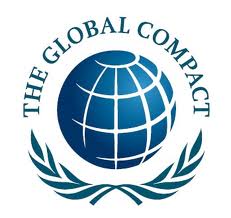For companies like Nike and BP, whose financial bottom line does not allow them to deal with the deep-seated causes of their poor reputation, the United Nations offers additional reputational support. In 1999 the United Nations sponsored a partnership with corporations centered on a code of principles entitled the UN Global Compact.
Nations offers additional reputational support. In 1999 the United Nations sponsored a partnership with corporations centered on a code of principles entitled the UN Global Compact.
The UN Global Compact is the world's largest corporate citizenship and sustainability initiative. Since its official launch on 26 July 2000, the initiative has grown to more than 8,000 participants, including over 6000 businesses in 135 countries around the world.
The compact, which was written "with considerable input from the International Chamber of Commerce", commits corporations who sign up to uphold ten principles. These include the right to join unions, the elimination of child labor and the elimination of all forms of forced and compulsory labour. However critics argue that the compact is merely a means by which companies that have been accused of human rights violations can “win UN endorsement and use the UN emblem to give their corporate activities a branding makeover, while doing nothing of substance to clean up the conditions in their factories and industrial sites.”
The Compact's three environmental principles are:
To participate companies need to pay an annual fee and commit to and promote the Compact principles, reporting their implementation of them in their annual report. "This does not mean that the Global Compact recognizes or certifies that these companies have fulfilled the Compact’s principles". Membership does not imply any certification of adherence to the principles by the UN.
The compact is voluntary and has no monitoring or enforcement mechanisms. All that is required of companies is that they place information on a UN web site about the steps that they are taking to improve working conditions and reduce environmental degradation. Joshua Karliner, executive director of Transnational Resource and Action (Trac) says “It allows companies like Nike … to wrap themselves in the UN flag without any binding commitment to change”.
Critics have referred to the Compact as a form of "bluewash" because companies with poor human rights, labour and environmental records have been allowed to join. Early members included Nike, Shell, Rio Tinto, Novartis, BP, Aracruz, BASF, Daimler Chrysler, Bayer and DuPont. "When biotech leaders Novartis and Aventis appear as part of the Global Compact, there is an impression that the UN has officially endorsed its products-genetically engineered seeds and foods-despite the enormous controversy over the issue."
The UN Global Compact Annual Review 2008, based on survey responses from more than 700 participating businesses in 90 countries, noted that only 30 per cent of companies with subsidiaries required their regional branches and suppliers to implement the scheme’s principles, and only nine per cent of companies with subsidiaries even considered spreading their Compact commitments beyond headquarters.
In February 2012 Dutch investment company Delta Lloyd excluded 38 companies from its investment portfolio for violating the UN Global Compact principles. "Almost half of these companies are Global Compact members, including BP (excluded for severe environmental pollution), Goldcorp (excluded for violation of human rights) PetroChina and Total (both excluded for violation of human rights in Birma & Sudan)."
A number of NGOs have participated in the compact to add to its credibility including Amnesty International, the World Wide Fund for Nature and labor organizations such as the International Confederation of Free Trade Unions. Member companies are able to post their so-called "best practices" on a UN website. However this is no guarantee that the material posted on the web site will be more than empty rhetoric it is not expected that there will be any monitoring of the claims made.
Critics also argue that "Corporate influence at the UN is already too great, and the new partnerships are leading down a slippery slope toward privatization and commercialization of the UN system itself". Moreover they point out that "'by promoting these instruments as substitutes for international governance institutions, the UN and OECD effectively undermine the ability of national governments to put forward a different approach."
Indeed the UN has its own agenda in promoting the compact. According to The Washington Post, Kofi Annan, then Secretary-General to the UN said that it would “help stave off a global backlash against unfettered trade” and “give a human face to the global market”. He said that he chose the areas of human rights, labor standards and environmental practices for the compact because these were the areas where there might be “a threat to the open global market”.